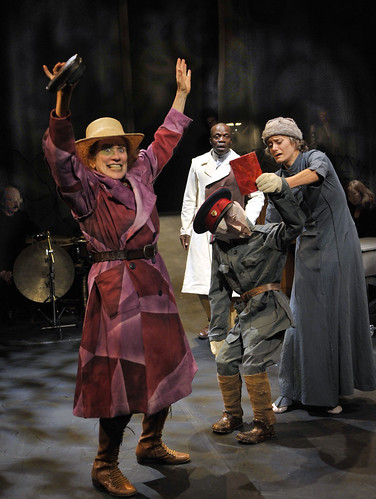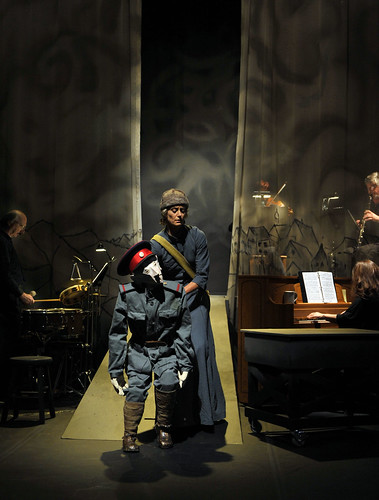The cast of Aurora Theatre Company’s The Soldier’s Tale includes (from left) Joan Mankin as the devil, L. Peter Callender as the storyteller and Muriel Maffre as Joseph, the soldier. Below: Backed by members of the classical chamber group Earplay, Maffre guides Joseph home from the battlefield. Photos by David Allen
As the weary soldier trudges down the road home, you see the weight of his exhaustion as well as his excitement to see his mother and fiancée in his every step. The remarkable thing is that this soldier – who goes by the name of Joseph – is a Bunraku-style puppet. All that extraordinary expression is coming from his puppeteer, Muriel Maffre, the San Francisco Ballet star who retired in 2007.
Along with Aurora Theatre Company artistic director Tom Ross, Maffre is the co-director of The Soldier’s Tale, a theatrical fusion of music, dance, puppetry and storytelling that carries a melancholy charm for its brief 75 minutes. Much of that charm comes from Maffre, who also dances the role of the King’s daughter, who falls under Joseph’s spell.
It’s easy to succumb to this Tale. L. Peter Callender is the storyteller and also gives Joseph his voice from time to time. He guides the story from Joseph’s homecoming march to his fateful meeting with an old man on the road. The two agree to exchange knowledge – Joseph will trade his violin for the old man’s magical book about future fortunes, and they will spend three days teaching each other what they know.
That old man, played with wicked glee by Joan Mankin, is actually the devil, and those three days turn out to be three years in devil time. So when Joseph finally gets home to his village, he is shunned because everyone thinks he’s a ghost, and he finds out his fiancée is now married with children. What’s a bedeviled soldier to do? If you’re Joseph, you simply carry on. Unfortunately for him, though, the devil stays on his tail.
Joseph tries to outsmart the demon, and does manage some happy years, but apparently you can’t outrun the devil. At least that’s how it goes in the story by C.F. Ramuz, who collaborated with composer Igor Stravinsky on The Soldier’s Tale in 1918. This is a grim story made all the more unsettling because Joseph is a seemingly good guy who has followed the rules. Why the devil is determined to destroy him remains a mystery.
This beguiling theatrical mélange is at its most extraordinary when Stravinsky’s score, played by four members of classical chamber group Earplay and arranged by Jonathan Khuner, is at its most eclectic. There’s jazz and rag and dissonance and captivating beauty. Donald Pippin’s translation of the book has its pleasures, but I found the rhyming dialogue to be childish in a way the music is not. There’s a deeply serious tone to this tale, and the cute and clever rhyming is occasionally at odds with that tone.
In the Aurora’s intimate space, experiencing music and dance is especially rewarding – you’re right in the middle of it all, right there with poor old Joseph, a soldier in an epic battle for his soul.
FOR MORE INFORMATION
The Soldier’s Tale continues through Dec. 18 at the Aurora Theatre Company, 2081 Addison St., Berkeley. Tickets are $30-$48. Call 510-843-4822 or visit www.auroratheatre.org.


